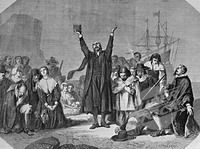Login form
Puritans
 Today we think of Puritans as people who marched through history with stern, sour faces. But that's not quite the whole picture!
Today we think of Puritans as people who marched through history with stern, sour faces. But that's not quite the whole picture!
In the 1500s and 1600s, Puritan men and women belonged to a religious group that hoped to purify, or reform, the powerful Church of England. Most Puritans believed God wanted a simple church, without paintings and statues. They did not want control of the church in the hands of wealthy bishops appointed by the king.
Some English Puritans carried their beliefs across the Atlantic Ocean to find freedom in America. In the 1620s and 1630s, Puritans founded the New England colonies of Massachusetts, Rhode Island, Connecticut, and New Hampshire.
Puritan beliefs about religion, education, and government greatly influenced life in colonial America.
WHAT WERE PURITAN BELIEFS?
Puritans believed that people lived in a state of sin ever since Adam and Eve left the Garden of Eden. To Puritans, sin meant disobeying God’s teachings. They thought that God chose to save only a few souls and send them to Heaven. No one knew who would be saved.
Puritans spent hours in prayer and examining their lives. They asked themselves, did they live by the Bible's teachings? Did they work hard? Parents encouraged even small children to pray that God would change their sinful hearts and souls.
On Sunday, known as the Sabbath day, Puritans attended church services that lasted all day! No one worked or played on the Sabbath. That would dishonor God.
Puritans believed God might reward them if they fought the Devil—the enemy of God—and sin. If a person did well in life, it could mean that God had helped them. Perhaps that person was one of God's elect, or chosen people, Puritans thought.
Puritans wanted to end the control of church matters by kings and bishops. Most Puritan churches were run by church members and ministers. Each church governed itself according to the Bible.
LIFE AS A PURITAN
Men were at the center of a Puritan household. The home revolved around self-discipline and diligence (hard work). A wife helped her husband and was in charge of the kitchen. She carefully ran the home, making sure not to waste anything. Children obeyed their parents. No laziness was allowed. These qualities helped Puritans survive in the harsh American wilderness.
Small children played with homemade toys or enjoyed sports. But Puritans believed too much play wasted time, and time was a gift from God. Children were encouraged to work, pray, and read the Bible instead.
Parents feared the Devil—also called Satan—might gain hold of idle, lazy children. A children's poem of the early 1700s by English writer Isaac Watts warned, “In Works of Labor or of Skill/ I would be busy too;/ For Satan finds some Mischief still/ For idle Hands to do.”
Puritans frowned on public entertainments, such as dancing and theater. They didn’t celebrate traditional holidays such as Christmas. They believed holidays encouraged bad behavior, such as eating and drinking too much. But they did gather for weddings or when they helped neighbors with work. They also met at church and for prayer meetings.
PURITANS AND EDUCATION
Puritans stressed education so that all people could read the Bible and escape Satan’s tricks—tricks to make people lose faith in God. One of the first schoolbooks for children was written by Puritans—the New England Primer. Puritan schoolbooks taught children their ABCs as well as moral lessons, such as obeying their parents.
Puritans also believed in higher education. They helped start both Harvard and Yale colleges, schools that today are among the finest in the world.
HOW DID PURITANS GOVERN THEMSELVES?
New England Puritan communities used town meetings to handle disputes and make decisions. Male church members could speak their minds at these meetings. The men voted on issues, and whichever side had the most votes would win. The result would govern the community. This system influenced the growth of democracy in the American colonies.
Puritans may have wanted religious freedom for themselves, but they did not offer that right to other religions. They also condemned people who questioned Puritan beliefs. Puritan minister Roger Williams was banished (sent away) from Massachusetts in 1635 after a number of disputes with the colony leaders. Williams founded the colony of Rhode Island, where different religious beliefs were allowed.
Puritans seem like hard, unforgiving people. Yet their strong work ethic, stress on education, and firm religious and moral beliefs helped shape the personality of America.
Source: Microsoft ® Encarta

